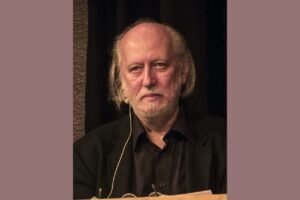Nobel Prize 2025 in Literature
|
General Studies Paper II: Important International Institutions, Important Personalities |
Why in News?
The Nobel Prize in Literature 2025 has been awarded to Hungarian author László Krasznahorkai, whose visionary and deeply moving writings explore human emotions amid apocalyptic chaos.
Who is László Krasznahorkai?
- About: László Krasznahorkai is a Hungarian novelist and screenwriter born on 5 January 1954 in Gyula, Hungary. He writes in Hungarian but his works are translated into many languages including English and German. His father, György Krasznahorkai, was a lawyer and his mother, Júlia Pálinkás, worked in social security. For many years he lived in Hungary but also spent time abroad in Berlin and other European cities.
- Education: He completed high school in 1972 at Erkel Ferenc High School, where he specialized in Latin. In 1973, he began studying law at József Attila University (in Szeged), then in 1976 he transferred to Eötvös Loránd University (ELTE) in Budapest to continue legal studies. Between 1978 and 1983, he pursued studies in Hungarian language and literature at ELTE. He worked at the Gondolat Könyvkiadó (Gondolat Publishing House) during his literature studies.
- Career: After finishing his formal education, Krasznahorkai worked as an editor until 1984, when he chose to become a freelance writer. He also wrote essays, short fiction, and works that combine philosophy, travel, and reflection.
- Major Works: He published his first novel, Satantango, in 1985. That book became a landmark in Hungarian letters and was later adapted into a seven-hour film by director Béla Tarr in 1994. Over time he published novels like The Melancholy of Resistance (1989), War and War (1999), The World Goes On (2013), Baron Wenckheim’s Homecoming (2016), Seiobo There Below (2008), Zsomle Is Waiting (2024), etc.
- Honours: In 1987, he won the Attila József Prize. He held a DAAD fellowship in West Berlin around 1987–1988. He won the Kossuth Prize (Hungary’s top cultural honor) in 2004. He was honored with the America Award (2014), International Man Booker Prize (2015), U.S. National Book Award for Translated Literature (2019), Prix Formentor (2024).
Features of László Krasznahorkai’s Works
- Deep philosophical reflection: László Krasznahorkai’s writings explore the deepest layers of human thought. His novels ask questions about existence, destiny, and chaos. He uses ordinary lives to express large ideas about truth and suffering. The philosophical tone in his works gives readers a slow but strong understanding of human endurance.
- Long and flowing sentence structure: His writing style is known for its long, continuous sentences that stretch across entire pages. He avoids short breaks and keeps his narrative flowing like a stream of consciousness. This creates a hypnotic rhythm and demands full attention from readers. The technique allows emotions and thoughts to unfold naturally.
- Apocalyptic and dark atmosphere: The atmosphere in his fiction often feels heavy and end-of-the-world like. His novels show ruined towns, collapsing systems, and moral decay. Yet, within the darkness, there is always a quiet struggle for beauty and meaning. His vision of the apocalypse is not only about physical ruin but also about inner emptiness and loss of faith.
- Human struggle: Most of his characters live in remote villages or forgotten places. They often struggle with loneliness, poverty, or loss. Through them, Krasznahorkai expresses how ordinary people carry extraordinary pain. He observes them with sympathy and patience.
- Strong moral and spiritual undertone: Even though his books show despair, they also carry faith in human dignity. His writing reminds readers that moral strength can survive even in a broken world. The spiritual element in his novels is subtle but powerful. It appears through symbols, music, and repetition of simple acts of kindness.
What is the Nobel Prize in Literature?
- About: The Nobel Prize in Literature is one of the world’s most respected international honors. It recognizes authors, poets, playwrights, or essayists whose work has made a lasting impact on humanity. It is given each year to one individual whose writing shows deep thought, creativity, and artistic excellence.
- Purpose: The main purpose of the Nobel Prize in Literature is to promote human values, imagination, and truth through writing. The literature prize supports the belief that literature can shape societies and connect people through stories.
- Ceremony: The award is presented on 10 December, the anniversary of Alfred Nobel’s death. The ceremony takes place in Stockholm, Sweden, where the laureate gives a lecture and accepts the honor before a large audience.
-
- Prize: The Nobel Prize in Literature includes a gold medal, a diploma, and a cash award. In recent years, prize money has been around 11 million Swedish kronor.
- Origin: The prize was established by Alfred Nobel, a Swedish inventor, chemist, and philanthropist. He created the Nobel Prizes through his will, signed in 1895. His idea for the literature prize was to honor “the person who shall have produced in the field of literature the most outstanding work in an ideal direction.” The first Nobel Prize in Literature was awarded in 1901.
- Selection Committee: The Nobel Prize in Literature is awarded by the Swedish Academy, which is based in Stockholm. The academy has 18 members, all these members serve for life. The members carefully read, discuss, and evaluate the works of nominated writers before choosing one.
- Selection Process: Any living author, regardless of nationality or language, can be nominated. The academy does not consider the writer’s political or social background. The focus remains only on the quality and influence of the literary work. The nomination process starts early in the year, and the committee reviews submissions for several months. After careful study, the winner’s name is declared publicly.
India’s First Nobel Laureate in Literature
- The first Indian to receive the Nobel Prize in Literature was Rabindranath Tagore in 1913. He won the award for his collection of poems, Gitanjali, which he translated into English himself.
- Tagore was born on 7 May 1861 in Kolkata, India. His poems reflect spirituality, human emotions, and nature. The Nobel Committee recognized the profound and universal quality of his work.
- Tagore’s Nobel win made him the first non-European laureate in literature. His work remains influential in poetry, music, and art in India and abroad.
- His poetry explores the relationship between humanity and the divine. He wrote in Bengali and translated some works into English to reach a global audience.
|
Also Read: Nobel Prize in Medicine 2025 |









